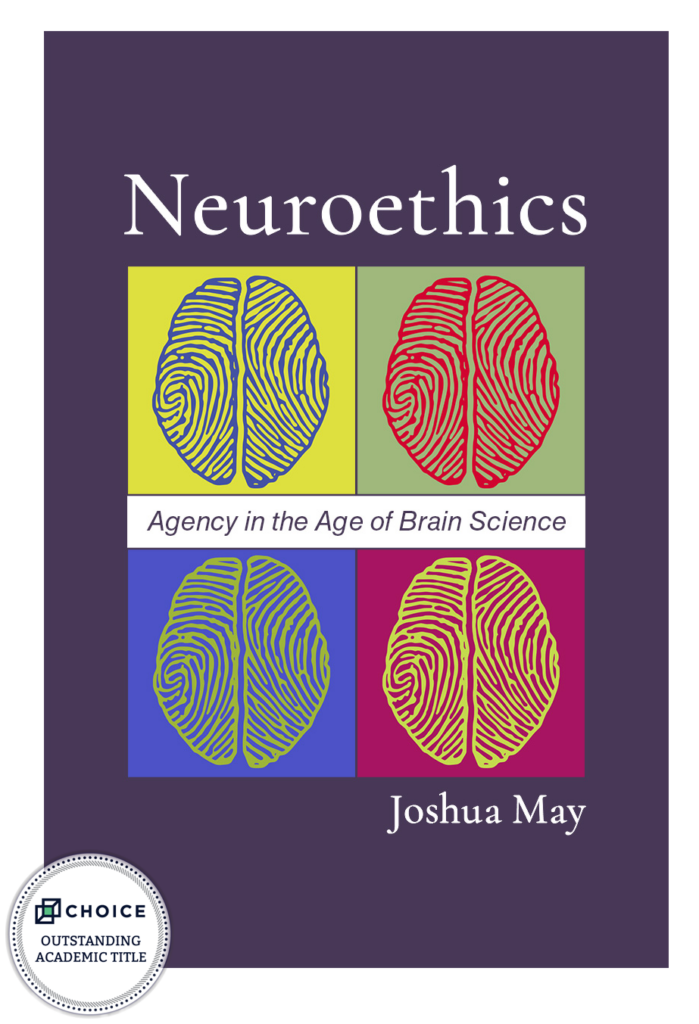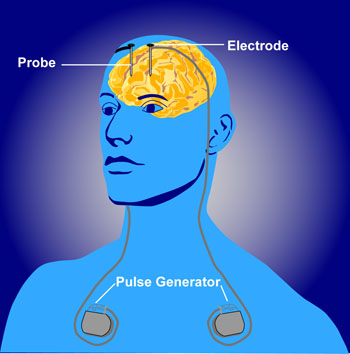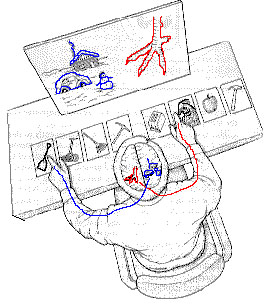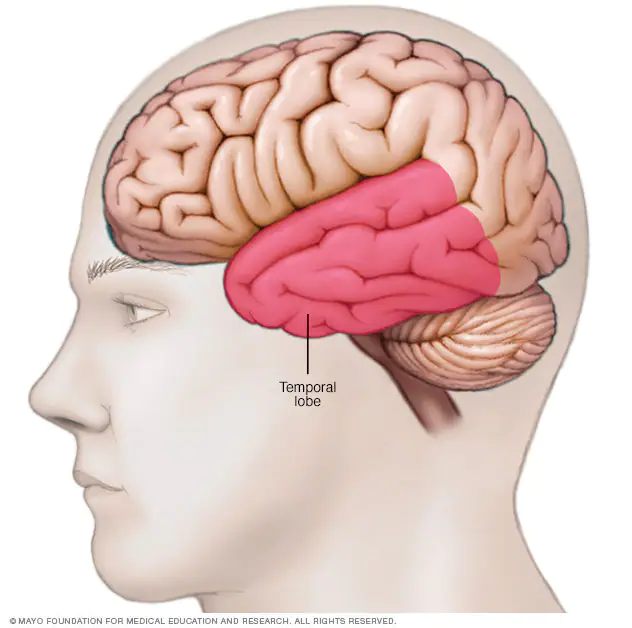
Neuroethics: Agency in the Age of Brain Science
by Joshua May (Oxford University Press, 2023)
- Top 10 Outstanding Academic Title of 2024 by Choice Reviews
- Available from OUP (30% discount code: AAFLYG6)
- Amazon, B&N, preview on Google Books
- Available electronically at Oxford Academic
- Book summary (precis)
Neuroscience is booming, fueled by sensational discoveries about the human mind, efforts to cure brain diseases, and promises to improve mental health. What ethical questions does it raise and help to answer? Neuroethics blends philosophical analysis with modern brain science to address central questions within this growing field:
- Is free will an illusion?
- Does brain stimulation impair a patient’s autonomy?
- Does having a mental disorder excuse bad behavior?
- Is addiction a brain disease?
- Should we trust our gut feelings in ethics and politics?
- Should we enhance our brains to become better people?
- Is human reasoning bound to be biased by our values?
- Can brain science be trusted to read the minds of criminals and consumers?
[The book ultimately answers “no” to the first four questions, “yes” to the rest.]
Neuroethics provides an opinionated tour of the field through captivating cases and serious attention paid to both the philosophical issues and scientific evidence. The result is a nuanced neuroethics that reconceives human agency as less conscious and reliable, but more diverse and flexible, than we ordinarily think. A central lesson is that disordered and neurotypical minds are more alike than they are unalike.
The text has a lively writing style that’s accessible to students and scholars in both the sciences and humanities.
Media
Podcast interviews: Neuroethics Today | Voices in Bioethics | New Books Network | The Free Will Show
Articles: Psyche | What happens on page 99 | UAB interview
Reviewed in: The Biologist, Choice, Perspectives on SCF, Philosophy & the Mind Sciences (symposium)
Praise
Neuroethics is hot but also complicated and controversial. How can inquisitive non-specialists learn enough to understand this growing field? Joshua May has provided a perfect solution. Just read this book. May’s overview is balanced and fair, stimulating and careful, profound and practical, concise and convincing.
– Walter Sinnott-Armstrong, Chauncey Stillman Professor of Practical Ethics at Duke University in the Philosophy Department, the Kenan Institute for Ethics, Psychology and Neuroscience Department, and the Law School
Joshua May has written the book we need: a comprehensive and persuasive examination of some of the most fascinating and significant issues that confront us today. Accessible without sacrificing careful argument, and filled with gripping case studies, it’s an excellent introduction to neuroethics that is also a book that will be valuable to the specialist.
– Neil Levy, Professor of Philosophy at Macquarie University and Senior Research Fellow at the Oxford Uehiro Centre for Practical Ethics
This is the book I have been seeking for my Neuroethics course! Philosophy, pre-law, and science students alike will delight in May’s real-life case studies and discussions of the brain science relevant to pressing philosophical problems. In the end, May encourages us to be suspicious of the idea that there are “neurotypical” versus “atypical” brains. Brains exist on a continuum: we ought to focus on our neurological similarities and not our differences.
– Katrina L. Sifferd, Genevieve Staudt Professor and Chair of Philosophy at Elmhurst University and Co-Editor in Chief of the journal Neuroethics (Springer)
Table of Contents
Introduction
1. Ethics Meets Neuroscience
Appendix: Philosophy and Brain Primers
Autonomy
2. Free Will
3. Manipulating Brains
Care
4. Mental Disorders
5. Addiction
Character
6. Moral Judgment
7. Moral Enhancement
Justice
8. Motivated Reasoning
9. Brain Reading
Conclusion
10. Nuanced Neuroethics
Chapter Summaries
Ch. 1: Ethics Meets Neuroscience
What is neuroethics? This chapter begins with the case of a sex offender who developed deviant desires following brain surgery. Should he be held fully accountable for criminal activity that resulted from his treatment for epilepsy? The case illustrates one kind of issue that lies at the intersection of ethics and neuroscience. A preview of subsequent chapters demonstrates the breadth of neuroethics. The book’s main aim is to provide a unified take on this burgeoning field, with serious attention paid to both the philosophical issues and scientific evidence. So the chapter ends with an appendix describing some basic philosophical and neurobiological concepts necessary for navigating neuroethics.
Key case – Kevin’s Klüver–Bucy Syndrome: “Kevin,” who had portions of his temporal lobe and amygdala removed to treat debilitating seizures, was arrested for downloading illegal pornography.
Keywords: Klüver–Bucy Syndrome, brain surgery, neurocentrism, mind-body problem, ethical theories, bioethics principles, neurons, neuroplasticity, neuroanatomy, cerebral cortex.
Ch. 2: Free Will
Does neuroscience show that free will is an illusion? A number of scientists believe so, because mostly unconscious brain mechanisms control our actions, which leaves us with no real choice. But such skeptical conclusions are not necessarily foisted on us by the science. Free will can exist even if it turns out to be a bit different from what you might expect. Our decisions are driven largely by unconscious forces, but these factors facilitate human agency. To kick off the discussion, we begin with another legal case, one of the first in which brain imaging evidence has successfully reduced the sentence of a defendant in a homicide trial.

Key case – Weinstein’s Window: Herbert Weinstein, an ad executive who pushed his wife off a balcony while a large brain tumor wreaked havoc on his frontal lobe.
Keywords: freedom, agency, Herbert Weinstein, determinism, epiphenomenalism, conscious control, ecological control, automatism, Benjamin Libet.
Ch. 3: Manipulating Brains
Do brain interventions impair a patient’s autonomy or sense of self? Brain stimulation, neurosurgery, prescription drugs, and other treatments do have risks, including changing one’s identity. However, the frequency of transformative experiences throughout life suggests that the self is quite dynamic and flexible. Nevertheless, risks of adverse events from neuromodulation are concerning given the history of unethical medical procedures in neuroscience, the specter of eugenics, and the overuse of many medical treatments. Threats to the self might be exaggerated, but greater medical humility is warranted all around, especially in brain interventions. A fascinating case of deep brain stimulation sparks these interrelated issues of adverse side effects, patient autonomy, and personal identity.

Key case – A Parkinson’s Patient: “Dimitry” a Dutch patient with Parkinson’s disease whose deep brain stimulation treatment led to marked changes in his personality.
Keywords: Parkinson’s disease, deep brain stimulation, brain interventions, autonomy, personal identity, Alzheimer’s disease, authenticity, transformative experience, risk-benefit ratios, medical nihilism.
Ch. 4: Mental Disorder
Does having a mental disorder excuse bad behavior? On a standard naïve view, the mentally ill are often regarded as clear examples of individuals lacking full-fledged freedom and responsibility. However, our evolving understanding of the brain and human agency reveals that there is more agency in mental disorders than it might seem at first blush. Psychopathology affects agency in such a variety of ways that it’s difficult to draw an inference about one’s moral responsibility merely from the fact that one has a mental disorder. Symptoms only sometimes reduce one’s agency and sometimes enhance it. This nuanced view paves the way for a cognitive continuum on which all people lie, which can help to reduce the stigma we commonly attach to mental disorders.

Key case – Two Homicides in Texas: Andrea Yates, who suffered from major depression and schizophrenia, drowned each of her five young children in a bathtub, but was deemed not guilty by reason of insanity. (Contrasted with Eddie Ray Routh who suffered from PTSD and killed celebrated sniper Chris Kyle at shooting range.)
Keywords: Andrea Yates, insanity defense, psychopathology, moral responsibility, blame, neurodiversity, disability, stigma, mental health.
Ch. 5: Addiction
Is addiction a chronic brain disease? Most health professionals now believe that substance use disorder is a brain disease that greatly inhibits self-control with respect to using drugs (including alcohol). Continuing with our nuanced approach, we see in this chapter that matters are not so simple. Although addiction is certainly a disorder of some sort, it’s not clearly a brain disease that erodes control. The brain mechanisms involved in addiction look to be the same as those involved in more ordinary failures of self-control. The difference is one of degree rather than kind. Our discussion begins with the case of an opioid addict who is punished in a drug court for relapsing.

Key case – Reprimand for Relapse: Julie Eldred, who repeatedly funded her addiction to opioids through theft, was briefly jailed for relapsing.
Keywords: substance abuse, brain disease model, irresistible urges, dopamine, reward pathway, incentive salience, self-control, spontaneous remission, deliberate abstinence, Rat Park.
Ch. 6: Moral Judgment
Should we trust our gut feelings in ethics and politics? Psychopaths’ brain abnormalities dampen moral feelings like compassion and remorse, which might suggest that emotions are generally good moral guides. However, both typical and atypical brains suggest that rational and emotional capacities are entangled. A different concern is that automatic emotions can lead us astray, as when we privilege the needs of the few over the needs of the many (in conflict with utilitarianism). But a careful look at the neuroscience suggests that our gut feelings are not inflexible and unreliable. They are central to healthy forms of learning and understanding that are lacking in extreme cases of psychopathy.

Key case – Dugan’s Defense: Brian Dugan, a vicious serial killer who exhibits the marked brain abnormalities of psychopathy.
Keywords: psychopathy, Brian Dugan, acquired sociopathy, moral emotions, moral reasoning, rationalism, moral dilemmas, trolley problem, dual process, debunking argument.
Ch. 7: Moral Enhancement
Should we alter our brains to become better people? This chapter evaluates five key ethical concerns with going beyond treatment to enhancing ourselves. Such endeavors could, for example, bypass one’s agency, promote a problematic desire to master oneself, or lead to the rich getting morally richer. Although such concerns are to be taken seriously, they are typically overblown. Brain interventions will work best and most ethically when they merely aid more traditional forms of character building, such as moral instruction and exemplars. These work through our rational learning mechanisms rather than bypassing them in some posthuman fashion. The result is a realistic conception of moral enhancements as no more problematic than traditional modes of moral improvement. To make our discussion concrete, we begin by considering the neurobiological manipulation of intelligence and compassion.

Key case – Microdosing Morality: Ayelete Waldman, a writer who temporarily self-medicated with psychedelics in an attempt to become a better person.
Keywords: psychedelics, microdosing, bioenhancement, brain stimulation, authenticity, freedom, resilience, fairness, safety, homeostasis.
Ch. 8: Motivated Reasoning
Is human reasoning bound to be biased by our values? Split-brain patients are prone to make up explanations to justify peculiar behavior, but so do neurotypical individuals, including neuroscientists. Confabulation, rationalization, and other forms of motivated reasoning can make anyone biased in their collection or assessment of evidence. We are quite the opposite of Lady Justice, whose blindfold represents objectivity. Even neuroscientists are motivated to acquire profit, promote pet theories, and secure jobs for their lab members. And these goals can lead researchers to oversell their findings, ignore methodological problems, and rationalize questionable research practices. Nonetheless, there is reason to be optimistic about human reasoning and its ability to produce scientific knowledge through a marketplace of competing ideas and evidence.

Key case – Split-Brain Self-Deception: Callosotomy patients who clearly confabulate after the connection between their brain hemispheres is severed to treat their severe epileptic seizures.
Keywords: confabulation, self-deception, anosognosia, wishful thinking, values in science, scientific misconduct, QRPs, replication crisis, egoism, altruism.
Ch. 9: Brain Reading
Should we trust brain science to read the minds of criminals and consumers? Concerns about justice, privacy, and the health of society might make one deeply suspicious of using neuroscience in such contexts, but such alarmism is unwarranted. Concerns about neuromarketing are often based on overinflated claims about the power of brain imaging to uncover our deepest desires. In contrast, some neuroscientific technologies do provide useful evidence in the law, or at least as useful as the evidence we already permit (an argument from parity). The benefits are modest, but this also limits the damage brain reading can do. Moreover, the meager benefits can be amplified when combined with other tools we already have in our legal toolbelts. The chapter begins with a case in which a man on death row is exonerated partly on the basis of his brain activity.
Key case – Exoneration by EEG: Terry Harrington, a former inmate wrongly convicted of murder whose exoneration was supported by “brain fingerprinting” evidence.
Keywords: brain fingerprinting, lie detection, legal evidence, base rates, reverse inference, neuropredicton, neuromarketing, privacy, brain-computer interface, neurohype.
Ch. 10: Nuanced Neuroethics
In this concluding chapter, we return to the grim case of Kevin’s brain surgery and draw out some general lessons. Each chapter might seem to tackle rather distinct topics, but together they suggest a unified approach to the field. A nuanced approach to neuroethics emerges that reconceives human agency as less conscious and reliable, but more diverse and flexible, than we ordinarily think. An overarching lesson for medicine, law, cognitive science, and public policy is one of cognitive continuity: disordered and neurotypical minds are more alike than they are unalike. By avoiding alarmism and embracing nuance, philosophy and neuroscience can work together to improve the human condition through a better understanding of it.

Key case – Back to Kevin’s Brain Surgery: In addition to further analyzing Kevin’s case, we focus on neurodiversity (so cases of individuals with autism are fitting to discuss).
Keywords: brain surgery, moral responsibility, agency, alarmism, brain overclaim syndrome, vigilance, neurodiversity, autism, stigma.
📝 Teaching Resources
For instructors and students using this as a textbook:
- Discussion Questions for each chapter
- Sample Syllabus (see also APA Syllabus Showcase)
- Assignment: Discussion Pieces
- Assignment: Experiential Learning (Agency Project)
- Assignment: Essay (with grading rubric)
Dr. May’s Neuroethics book was phenomenal… particularly well written and the material was presented in an approachable and easily digestible way—I will continue to refer to this book in the future.
– Student evaluation from my Neuroethics class (anonymous).

